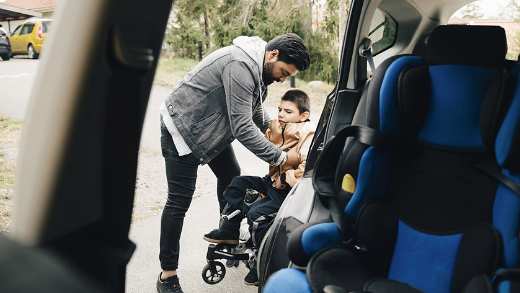What can supportive employers do to make working from home easier for their people?
In this episode of the Aviva podcast you’ll hear from Danny Harmer, Aviva’s Chief People Officer, and James Millar, editor of workingdads.co.uk and author of the book Dads Don’t Babysit.
Many businesses offer family friendly policies aimed at improving employee work-life balance. Flexible working, parental leave, time off for carers, sabbaticals, duvet days and more. But to what extent has Covid-19 and lockdown changed what workers expect from their employer with regards to a flexible working schedule?

"Try not to worry, we will support you, do what you can to support the customer, your organisation as well as managing what you're managing at home."
Danny Harmer
Aviva’s Chief People Officer
Transcript
Joe Booth: Welcome to the Aviva Podcast. Today, I’m joined by Danny Harmer, Aviva’s Chief People Officer, and James Millar, editor of workingdads.co.uk and author of the book Dads Don’t Babysit.
In this episode of the Aviva Podcast we’ll be talking about flexible working. The new school year has begun for many children. In the UK, Aviva offers parents half a day’s leave to spend with their child as they start a new school.
Many businesses offer family friendly policies aimed at improving employee work-life balance. Flexible working, parental leave, time off for carers, sabbaticals, duvet days and more. But to what extent has Covid-19 and lockdown changed what workers expect from their employer with regards to a flexible working schedule?
Joe Booth: what message does it send when an employer has a policy to give parents half a day's leave when their child starts a new school?
James Millar: it's an interesting policy, this year, because it's not as good as previous years. Because previous years, people would really appreciate having that time off while their child started school, obviously most people, a lot of people are working from home so they're around to do the pickup and drop off - that doesn't detract from it - but I think its value is as a signpost. It's that thing of saying these are our values, it's a massive easy way - I'm doing your job for you, you should be saying this bit -
Danny Harmer: I love it when you say it.
James Millar: it's a very easy, big way of saying 'this is who we are and we understand that you have those responsibilities outside of work'. And while this year, it's not quite as generous a gift as it might have been in previous years, the message is even more important, because people have so many more concerns outside of work, because there's much more going on.
Danny Harmer: I think you're right that it doesn't necessarily feel as much as an impact to the parent or carer, the half day because people are now working much more flexibly - but I think it's more important this year to pause and go… so for children who are going to school for the first time, it's actually saying - they probably would have been in nursery and they haven't had that, they haven't seen their friends, they haven't interacted with other children in that way for ages, I almost worry most about the children who were already in school and they're just going back to the school but they haven't been there since March.
My youngest child is 14, and being a 14 year old girl - I don't remember because I'm really old - but judging by her it can be quite a complicated thing to be. I know there are hormones and girls and Instagram and Snapchat, and I'm missing out all the stuff that I should - she'd be mortified that I'm even talking about it - but being out of that environment and in a much easier home for six months and then going back into it, I worry about those children. I think that half day is really important. And also just getting into school now is going to be complicated, do you need to wear a face covering, how are you getting there, do you have to queue to get in, you're in a bubble in your year, are you taking food. It's tougher. And whilst people might have found it easier to manage around that half day, I think it's even more important that we say, this is a tough time for our young people.
James Millar: that speaks to the ongoing support - the half day isn't that big a deal in a practical sense because you're around anyway - but that message you send. My daughter's the same, she's 12, the last six months have been lovely, she and her brother have been knocking around fine, but I know the peer pressure kicks in, when she goes back on Friday, peer pressure's gonna come back into the picture and that's when you have those issues, you need to deal with Snapchat and all that and that will interact with your work-life and you can't just sit at your desk and forget that your daughter's having a hard time with… I dunno what they do on there frankly, I probably ought to pay more attention, eh, but it sends that message that it's understood that you have these issues outwith work and they are important.
Joe Booth: Some groups of people (like working parents) have found it challenging in lockdown to juggle working from home with caring or parenting. What can supportive employers do to make that easier? James, let's come to you first.
James Millar: Do you know, it's something that a lot of us have learnt to appreciate in lockdown in lots of different ways, but the first thing I would always go to is communication. You know, I think we've all learnt household communication is always really important, in lockdown, and communication between employers and employees and that works both ways. We're talking about employers supporting parents but parents have also got to talk to their employers and say 'here's what I need, help me'.
So I think communication is a big one and the other big one is empathy. Again, it's just a nice, human thing - it's nice to be empathetic. But you know, try and understand what your employees are going through, and help them accordingly. You know, that comes down to, people who've been there and done it, are more likely to be empathetic to their employees, I would suggest.
We can talk about that, why that's important and why you should have parents in visible positions in your company and perhaps women because, as a rule women have to, or traditionally have had to do more juggling than men. That's something that I'm very much trying to change with Working Dads and with my book.
I can talk about more practical steps and maybe we'll come onto that, but the two sort of big overarching themes, I think, are communication and empathy.
Danny Harmer: I think those are really good points, James, and communication absolutely. There are lots of conversations within Aviva and I saw them outside of Aviva during the early and middle part of lockdown about communication and I think everybody agreed, you can't overcommunicate. I think the other thing, empathy, absolutely right, reassurance as well, just to build on that empathy. 'I understand and please try not to worry, we will support you, do what you can to support the customer, your organisation as well as managing what you're managing at home.
And the been there and done it bit is a fascinating one because, I think I am a much better leader since I had children. And I think there are some amazing leaders who haven't had children, don't want to have children, and I'm sure there are some slightly less great leaders who have had children but for me, the start point of where I was, to where I am, children teach you so much on learning to juggle and make choices and be happy with the choices you make - I wholeheartedly support that, James.
James Millar: it's an interesting one, you have to be very careful how and when you approach it. But, it's the thing we've been discussing to some extent during lockdown, that thing called the mental load, that is not just doing stuff around the house, but thinking about it. So knowing when your child has PE day, when they have a packed lunch and that sort of stuff. And traditionally that has fallen on women, we don't want to get into whether that's right or wrong or whatever, but that's just the world as it is and we've got to deal with that and try to change that for the better.
And a lot of men have been thrown into that in the last few months who had never done any of it before. What's been a really interesting experiment we've been running is a series on Working Dads which of course you know about because you contributed to it, which is 'Working Dads in Lockdown' and there's been some really interesting themes emerge and one of them is, the number of men who didn't realise how much was going on in the house that they weren't doing, but then had to because they were at home, but also we've had a few say exactly what you're saying there. They learnt new skills in lockdown, which they're now taking back to the workplace. And to some extent they wish they had those skills much earlier.
This just sounds like I'm just working for Aviva here, but of course Aviva are very good at this, because of course you offer the extended parental leave which gets dads involved, and I know huge numbers of dads in Aviva take paternity leave, are involved from the off, and that's how we change things, that's how you support parents more widely beyond lockdown, you help them, let them get involved from the very beginning.
Danny Harmer: I was talking to a member of my team who's come back from six months' parental leave today, is a dad, and my first question was how's it been, have you enjoyed it? And he said, I think I just understand my child better and in a way that I just wouldn't have done if I'd been going to and from work. And as you say, quite often that responsibility falls to the mum. And definitely, times have moved on since, you know my children are 18, 16 and 14 now, my husband got two weeks' paternity because he was with a really nice employer.
And I remember one of my girlfriends saying when I was pregnant with my eldest, she'd had a child and I said how are you managing, because I knew she worked. And she said, oh you know my husband's really supportive, but there's something about it - it's coming back to your point about mental load, James. She says my husband doesn't have that kind of whirring voice in his head saying do their shoes still fit, do their toenails need clipping, does their hair need cut, have they got the right kit, have they got the right lunch.
There's a difference in the way people, certainly, approached parenting. And I think if we can help with that balance by providing time for both parents to get involved, that's a good thing, right? And I do think you learn new skills.
James Millar: And I do think, to be clear that's not a gender thing, that's the thing. In my house, I take the mental load. I'm the one who works part-time and freelance and my partner works full-time. So I'm a bit weird in that regard. But again, the Aviva extra parental leave has shown that men want it. That's the thing, if you pay it, you provide it, men will take it so it's not that there's some sort of 'men don't want to spend time with their kids', you've just got to lay it on and give them the opportunity and they will.
And you know, that improves everything for everyone, that's the thing. It's not just about letting men have time with their kids, I'm not necessarily here just to speak up for Aviva, this is stuff that was in my book. I'd like to think somebody at Aviva read it and went 'that's a good idea, let's do that!' but I think the two sort of happened around the same time.
But you know, it's better for women because they can get on with their careers better because when some horrific pandemic arrives and everyone goes into lockdown, it's better because the work in the home is more equally shared and everyone can get through it better. It's just better for everyone. There's not many policies are, but this one I really think is.
Danny Harmer: it feeds through into role modelling as well. I am really proud that I've got two girls and a boy, so that my girls assume that workload is shared around the house, both parents can have an interesting career if they want one - all of this is clearly, if you want to - and that you kind of work through this as a partnership. And I think certainly, having been a girl, it has been particularly important up till now for girls to see that, that balance.
James Millar: yeah, although - it is, on one half of it, the sense that it's important to see the career side of it, but there's a thing called the State of the World's Fathers report, every two years which shows it's really important for boys to see their dads doing housework. They'll do it as well, they'll regard it just as the girls regard, think you can have a career. Boys see dads do stuff around the house and they will then copy that behaviour and you get that sort of equality and again, as you say, that role model thing is really important in terms of men doing flexible working, dads doing flexible working.
You look at the stats, there's a huge number of women who have flexible working arrangements but the numbers for men are less than 10%. But that's not true - it's that men have informal flexible working arrangements. They won't go and say to their line manager 'I want to work flexibly' - they'll say 'can I get off early to go and pick up the kids' on a Friday, and nothing's ever signed so it doesn't show up in the figures.
But it's really important - and again - I sound like I should be the Aviva guy here! - but you've got the…
Danny: I love you, James!
James: you've got the high-profile job share guys, you know, I know you share cases of when dads do take extra paternity leave, you're very good at advertising it and role modelling it. Role models are really important and when it comes to flexible working we need more men and more dads not just doing flexible working but signing the agreements and saying 'I'm going flexible because I want to spend more time with my kids and do more around the house' and talking about why they're doing it and how it doesn't hold them back. Because it doesn't, we know that.
Danny Harmer: it's lovely to hear you're a fan of Aviva James, but we're far from perfect. There's always more we can do and interestingly, we have several communities at work that look at diversity and inclusion and one of them is our carers network. It's a network that arguably, apart from the gender balance network, should have the most people in it. And yet, it's not that well subscribed… people follow it and engage with it, but there's something about, almost some stigma about being a carer because you have to try and manage it on the quiet and it's 'not interfering with my job' and we've just got to - it's the conversation we had at the beginning - turn it back on its head: I'm probably better at what I do because of the things I've learned in my life through being a carer.
And one of the conversations we had in Carers Week in June, I said we just need this loud proud - we've encouraged people to come out as LGBT+ - we want people to come out as carers. You know, hashtag I am a carer and I'm proud of it, and it's not something I have to hide.
Because when I talk to women who are in leadership roles or said 'will you mentor me', and they go 'do you have children?' 'yes,' 'how many do you have?' 'three,' and they go 'oh my god, how do you manage it?' and people want out, loud, proud role models talking about your experience, about how to cope with conflicting priorities, right?
James Millar: it has to be all levels, there has to be role models, and there has to be you standing up there saying 'look, I'm doing this' - but obviously, you are successful. There's an element of, she's got that because she's got boss benefits. But what you also need is, people at all levels, doesn't feel like you need to get to the top to get this flexible working, get the role models right throughout any organisation, top to bottom and just seems very normal and not something you have to earn over years, it's something you can have from day one.
Danny Harmer: I agree and I remember reading Lean In by Sheryl Sandberg. It's a fascinating insight from a woman on leadership, but back to your point about it needing to be at all levels, she has been incredibly successful, right? And her approach to managing being a carer and having a family, as well as a very demanding job, is not accessible to most of us. I'm not sure that helps me, and I'm sure there are lots of people it doesn't help, so absolutely right about, you just need to have it at all levels.
And you know, earlier on in my career, the way I managed it with younger children, and I was earning less and the demands were different, it changes every day.
James Millar: I think that's important as well, the stuff I do, and obviously we're talking about it here, the Aviva paternity policy and all that sort of stuff, it's good but being a dad, being a parent, doesn't stop when they get to nursery, get to school. There's been some interesting research done amongst men, you know, there's limited research done with men and dads and I understand why that is - obviously I am a great believer that this is the last part of the feminist puzzle that we need to actually think about men and dads to achieve equality - but there seems to be, a lot of men seem to regard the switch from primary to secondary as quite an important moment - and that's when they need to be around for their family, they recognise those early weeks, obviously, but some of this research looks at when men would like to be able to work flexibly - a surprisingly large proportion cite this change from primary to secondary school.
And of course that is a big change in your child's life - after that, to some extent, there aren't any other parent… I mean god knows it never ends, as you'll know better than me because yours are slightly older than mine but, in terms of being around to help your kids, that is the last, I suppose you go into exams and stuff, but that change. And it's interesting that it's not just about babies and paternity leave, it's flexible working and parenting. Has to go right through - and then you might become a carer not long after that! So flexible working just has to be the norm right the way through I'd suggest.
Danny Harmer: what I've found is that as they get older, the questions and what they need help with become much more challenging for you as a parent. You know, when they're little, do they feel warm, safe, loved. Actually having had support from a childcare perspective, as a parent of a very young child you have this cynical wrench of asking somebody else to make sure your baby is fed and sleeps and is warm. Actually, as long as they are safe and loved, that has much less impact on them and how they develop than you being there the first time they ask questions such as… it can be 'where does meat come from?' that's one of the ones my eldest daughter said. And my husband, it's legend in our family, went 'go and ask your mother'. And I told her, actually, I did want her to know where meat comes from or, you know, what happens when somebody dies, or does God exist? Actually those are far more challenging. And tend to come after the baby stage. The questions keep getting more challenging, can you help me with my maths homework, if they're doing A-Level let me tell you right now, the answer is no I'm sorry I can't.
James Millar: I'll bow to your greater experience, but it feels like we're just sort of going into the teenage years. A couple of things there - one is time, seems important to carve out that time. Obviously everything went mad last year but for my daughter, her first few terms at secondary school, I was able on a Wednesday to go down and work in a coffee shop, cos I'm freelance and I get to work in coffee shops. When we had coffee shops. And she'd come and meet me after school, and we created this space where she felt quite grown-up and we had half an hour, an hour to talk about stuff. A benefit of, in my case, being freelance and the stuff I do with Working Dads is entirely flexible. You know, you can create that space.
And also, what you said about carers, and interfering with your job, it is going to interfere with your job if that's the word you want to use. It's going to interact with your job because you can't just walk away. Like you said, if your child asks you some question, whatever it might be - heaven knows in the last six months there's been people with younger children, god there's been some questions - you can't just switch that off and sit at your desk. Because you're thinking to yourself, did I answer that the right way, or you're thinking I've got to answer this question later on. And that's okay, because work and life - well, there's a fairly… I wouldn't say fiery but there's an interesting discussion around whether the phrase work-life balance is actually useful.
Danny Harmer: I hate that phrase, James. Because it implies work isn't part of life.
James Millar: ah, well… I'll go in to bat for it, it's quite a useful shorthand I think. I take your point, you know to some extent what I'm saying is what you're saying around work-life balance is that the two have to fit together, they're not separate. I like the shorthand and I like the idea of getting things in balance. I dunno. I'm not gonna fall out about it, but I'm interested in the discussion, I'm willing to be persuaded that it's actually a bad term, but if you're a carer, whether that's to a child, an elderly relative or somebody with a disability, whatever, it's inevitably going to interact with your work life. And that's where flexible working comes in, it's an employer that understands that. It doesn't mean you can't work, it doesn't mean you can't do a good job, it doesn't mean you can't commit and achieve the outputs, which is increasingly what I think we need to be measuring in this post-Covid world. (19:02)
Danny Harmer: and I think, interestingly, on the Covid lockdown point, if there are some good things that have come out of a terrible situation - people talk about how Covid has improved or created a kind of impetus around flexible working, I think what has actually happened around Covid and lockdown is that it's increased the flexibility around the location of where you work. That's what Covid did. Then people have realised, well, I'm at home all day, I know what the work is I need to get done, I can stop for lunch, with my children. Or actually, I need to homeschool my child this afternoon. I've got some things I need to do.
The start point was the location, then the demands of family or other things that people need to do has created this awareness around 'I'm paid to get the work done, but actually I can do it in a slightly different way'.
And then you start to think, right, so as people choose to spend some time - depending on the organisation, no time - back in offices, what will happen, what I'd love to see happen is that people understand if they have caring responsibilities, either children or elderly relatives - what previously wouldn't have been possible, which is 'I really need to pop and see my elderly mother for lunch twice a week just to make sure she's alright, but by the time I do that it's an hour each way and then half an hour with her, I can't do it', whereas the days I'm at home, I can.
You know, we can start to better blend, and you can do your half an hour in a coffee shop, and pick your daughter up from school on a Wednesday, even if you're not freelance. Because on a Wednesday quite often you're working from home. And that's fine, you go and do that, you have supper with your family and then you pick up where you left off.
James Millar: I think that's where we want to be getting to - I think it's that huge challenge, I talk about flexibility and true flexibility of being able to do what's right for you, but there is going to be issues like you say, I mean people go back to offices - I think a lot of people want to go back to an office not five days a week, but you know one, two, three days a week - but they have to make sure they're in the office at the same time as the people that they need to be in the office with. And you think, that's gonna be quite a logistical headache. It's manageable, and I'm sure you and people like you, and all sorts of organisations are starting to think about that now, but the challenge is one we need to be aware of and take on. Because there will be some companies who will be much more willing to go, well it's much easier just to have everyone in 9-5 and then I know where everyone is - or, the other thing is have everyone at home and we can just Zoom whenever we want and that's the easiest thing.
Danny Harmer: but each one misses out on something, doesn't it. Being remote, and being on screen, and being in two dimensions, the creativity, collaboration, some of the joy of people at work, you know I miss it.
Whereas if I'm going to spend a day doing emails, writing a couple of papers, on calls, you know, Aviva and I might as well not have me commute. So there's a bit less commuting, a bit less environmental damage, I get home a bit earlier, I leave home - walk into another room - a bit later. I'm sure most people kind of split the commuting time - there's potential for upside for everyone, we just need to have adult conversations around either the kind of job I do or the work I do within my job, where is the best place for me to do that. For me, my customers, for the organisation - where is it most effective all round. Take that into account but need to remember the organisation and customers in it too.
James Millar: it comes back to that thing of communication, doesn't it? The fundamental thing - and one of the other things that's interesting is trust. Before lockdown, I was talking to a lot of men who were working flexibly and they would say it's great, my employer trusts me, like this was weird - they would say, there's a job to be done, in a week or two we'll find out if you're not doing the job at home so you know, get on with it, we trust you.
But of course a huge number of employers didn't do that, they didn't trust people. It used to drive me nuts, like who is employing these people that they don't trust at home, or wherever? It's very much a recruitment problem, not a flexible working problem. But of course that's changed now.
Danny Harmer: I think it definitely has bust the myths around 'people don't work as hard at home', for sure. I think that I had conversations with a few - very few - leaders on other discussions, not just Aviva - saying 'well when someone's at home, how do I know what they're doing?' - you'd have to go right, when they were sitting 20 feet away from you in an office, looking at a PC screen, how did you know what they were doing. Come on. These are adults - if you have concerns, ask somebody - most people turn up. They want to do a good job, they really do.
James Millar: it's so weird, that whole mindset of - cos you would find out, if you employ somebody, that they're not doing the job - you're gonna find out pretty quick - if you don't find out, then you've got some weird non-job that you're hiring somebody for…
Danny Harmer: that's a cost saving for you, right there.
James Millar: …that doesn't seem to be helping anybody. Just that mindset, I can never quite get my head round it. But yeah, there's stats, there's gonna be an awful lot of research around lockdown, surveys and things into lockdown, and I'll blow my own trumpet for the Working Dads in Lockdown series we've been running, on Working Dads, because it's actually a bit more interesting than some of the dodgy old surveys that have been coming out.
But the one that caught my eye this week was about productivity, and it was quite a big one, American, fairly robust - it's not changed, essentially. Two thirds reported that productivity was the same, and a quarter reported that productivity had actually gone up! To those of us who, and if you read my book, we make the claim that productivity will go up if people work flexibly - it's been very gratifying to see that has now come to pass.
People will get the work done, they will to some extent get it done more effectively because they want to spend the evening with their kids, do their hobbies, run for a marathon if we ever have marathons again. We fairly comprehensively bust the idea that working from home leads to a drop in productivity and people just sit around drinking coffee.
Danny Harmer: look, if anything, as well as the point about - technology enables it, right, people should be able to be as productive - depending on the kind of work they're doing, the creativity and collaboration is trickier. What I worry about is that people are working harder from home, because all of the boundaries are gone, and certainly in full-on lockdown, there wasn't necessarily a lot else to do, so 'well, I might as well… ' and I did see people getting exhausted, there was just something about working in this way, all the time, just looking at a screen - that can be very wearing for people.
But yeah, productivity - in terms of a big proportion of what we view as work - should be possible to do from any location if you give people the right technology.
James Millar: and that's where the reassurance comes in, as well, people sometimes felt like they had to keep working, whereas actually you need to say 'it's fine, we understand it's a strange situation, do what you can, or here's the outputs' - a lot of it comes back to increasing focus on organisations' line managers - training to support people, training to buy into flexible working.
I think before the pandemic, the risk-reward calculation for line managers was weighted towards the risk of 'letting' somebody work from home, or whatever, they had too much to lose, was often the way it felt in an organisation with a less than enlightened attitude - where now we've obviously got the experience of working from home and the risk-reward calculation is altered. I hope so, anyway. Line managers - support, reassurance, all that sort of stuff - I think line managers come party to that.
Danny Harmer: line managers are absolutely key when people are worried, when there's ambiguity, when they're anxious and when things are changing. And there's a sort of soup of all those things going on during lockdown during the early stages. We spent a lot of time at Aviva helping leaders understand what impact they could have - here's how to lead remotely, here's how to do a one to one… and it might sound ridiculous but pushing masses of information and support and guidance to leaders, and just reminding them to make sure they were checking in with everyone in their team at least once a week. Great leaders do that anyway - but genuinely saying right, how are you, and then, how's the work going, how can I help, how can I support, what do we need to focus on. And then the quality of conversations and connection our people eel to their leaders. And probably, conversations becoming more adult has improved, weirdly, counterintuitively almost, while working remote.
Joe Booth: that's all we've got time for on today's Aviva Podcast, you can catch up on all things Aviva at aviva.com or on our Soundcloud account, @avivaplc.
Show notes
You can find more information about Danny, James or Working Dads on the following links:
https://www.aviva.com/about-us/leader-profiles/danielle-harmer/
https://www.workingdads.co.uk/author/jamesmillar/
https://www.workingdads.co.uk/
Here's a selection of our other podcasts
-

Features
Retirement: the longest holiday you’ll ever plan
22 Nov 2023
In this episode of the Aviva Podcast, Steve and Tom unpack workplace pensions.
-

Features
Aviva Pride: amazing, supportive and hopeful
27 Jun 2022
David, Jenny and Jason share their stories of what Aviva's Pride community is all about, why it’s so important, and what it means to them.
-

Features
Our carers community: compassionate, caring and resilient
7 Jun 2022
Listen in as Martin, Natalie and Kofi share their stories of why Aviva Carers is so important, and why the community means so much to them.
-

Features
Wellbeing special: living and working with autism
1 Apr 2022
In this wellbeing special episode, our host Johnny talks to Aviva employees and couple Matthew and Daniel about their experiences living with autism.
-

Features
Wellbeing special: dealing with loneliness
22 Dec 2021
In this wellbeing special episode, our host Johnny talks about loneliness with Dr. Rob Rosa, Chief Medical Officer at Aviva.
-

Features
A better day after tomorrow
11 Oct 2021
In this episode of our podcast series 'A Better Tomorrow', we dig a little deeper into climate change. What’s happening to our world and what, if anything, can we do about it?
-

Features
Wellbeing special: tips to tackle 'lockdown anxiety'
27 Jul 2021
In the first of a mini-series of wellbeing specials...
-

Features
The power of a sonic logo
23 Jun 2021
When Aviva unveiled its new brand positioning, 'It takes Aviva', it did something it's never done before.
-

Features
Could robots lead to a better tomorrow?
29 Mar 2021
It's been a hundred years since the word 'robot' was first used*, but are we another century away from seeing them in our daily lives?
-

COVID-19: The man who sent everyone home
12 Feb 2021
One year on from when we started hearing about COVID-19, we speak to John Bernard, Aviva's Director of Group Corporate Security.
-

Building a more inclusive organisation
20 Jan 2021
In this episode, we talk to six of our Aviva Communities co-chairs to find out how they're working towards making Aviva a more inclusive organisation.
-

Can ‘cognitive reserve’ improve resilience to dementia?
9 Dec 2020
In the latest episode of the Aviva Quantum podcast, we talk about increasing our resilience to the effects of dementia.
-

Retirement in the time of coronavirus
19 Oct 2020
People in mid-life are a population under strain. Could a simple app, empower them to take control and improve their work, wealth and wellbeing?
-

How to be a leader when you're at home
16 Jul 2020
COVID-19 has seen millions of people swap their offices for homeworking. How can you be an effective leader from home?
-

Ever heard of an MOT for humans?
5 Sep 2019
Every year, you put your car in for its MOT. But how often do we take a step back and give the important areas of our life an assessment?
-

Dementia: the 21st century's biggest killer
3 Sep 2019
Dementia is the 21st century's biggest killer and 1 in 3 babies born now will go on to develop dementia.

















